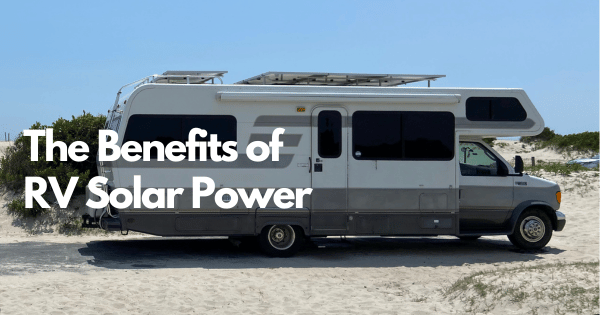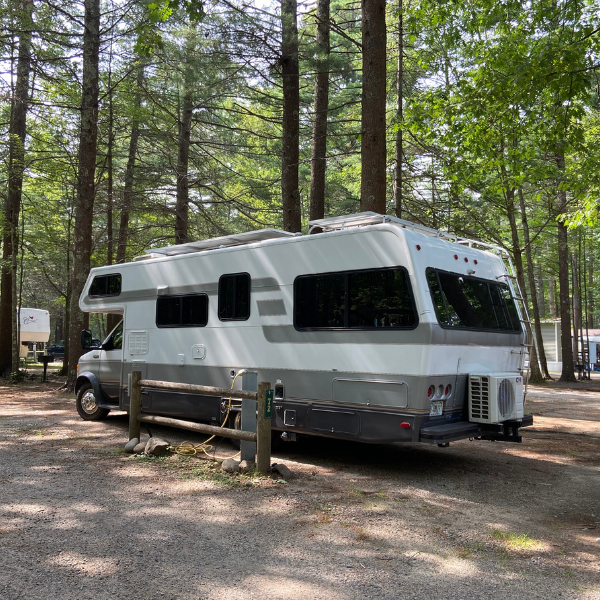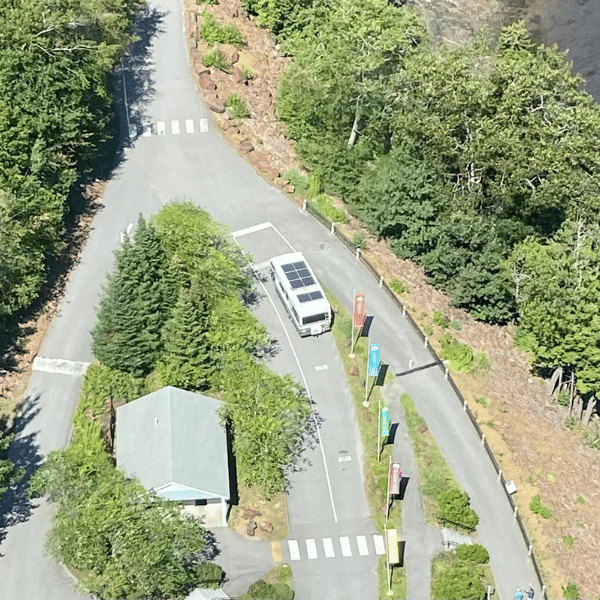7 Benefits of Having Solar Power in An RV

7 Benefits of Having Solar Power in An RV
Written by Nancy Carter, Making My Own Lane
My RV Solar Set Up
There are a few things that my 2005 Lazy Daze Class C MotorHome already had when I purchased her.
Some of the things, like solar and a composting toilet, were on my original wish list. You can read more about that in Choosing Your RV here.
And some things were pleasant, but problem-solving ideas, like the kitty door that goes into the bathroom.
As I am planning and booking sites for my next big trip, I am looking at options that do not have any hookups. So I think it’s a good time to talk about having solar in an RV.
What are the benefits of having solar power for your RV?
You’ve probably seen lots of solar set ups for RVs. Some of the newer motor homes have solar, but it could be as low as 100 watts, which you might be able to use only to charge your cell phone or your computer.
Some RVs have more watts and amp hours, but they still cannot run their air conditioners or even a microwave or coffee pot.
With my solar set up, I am able to:
Run my air conditioner, even at night.
Run my WiFi all the time, even when I am moving.
Monitor the temperature in the RV when I am not there, to make sure that Rufus, Willie, and Katie are OK.
Run security cameras, both inside and out, that I can monitor.
Run my refrigerator to keep everything cold.
Know that my power will stay on, even if the power in a campground goes out.
Not have to hook up to shore power immediately. I can take the dogs out for a walk, eat, or just hang out with friends first, all while running my AC in the RV.
Those are the things that are most important to me. And I can do all of this whether I am hooked up to shore power, or not.
How I run my Air Conditioner Using Just the Solar in my RV
All you need is sun! As long as I have sun, I can “boondock” or go off-grid indefinitely.
However, not every day is sunny, right? I have found I feel comfortable going up to 3 days with just clouds and rain, if I am careful about conserving energy. After that, I need to hook up to shore power.
I also have a mini split air conditioner with a heat pump that runs on regular 110. It consumes a lot less energy.

It’s just like the mini splits that some people install in their homes or offices. Mine is installed on the back of the RV, with the inside part blowing air into the bedroom area of my RV.
Something else I will do to conserve energy and keep my rig cool is to shut the door between the back of the RV and the front. This means I am only cooling half of my camper, but I can have AC while I’m sleeping and use very little power.
I also have thermal-paned windows and light-blocking curtains to help keep the cool in and the heat out, or keep the heat in and the cool out if I am camping in a cooler climate.
Most RVs have the AC units on the top of their rigs. They are loud and use a lot of energy. Some people put “soft starts” on their AC units.
A soft start allows them to start up their ACs without the initial large draw of power that their rooftop AC units usually take. This helps people to possibly use at least power one of their air conditioner units with their solar.
How I run my Refrigerator When I'm Using Just the Solar in my RV
As long as I have sun, I can run my refrigerator with my solar power.
However, the system is set up so that if my solar battery bank dips below 90%, the refrigerator will automatically switch to propane to help me conserve the lithium battery power.
I will usually just switch my refrigerator over to propane manually when I am boondocking. That extra 10% can go a long way!
What Are the Biggest Electric Draws on my RV Solar System?
My Keurig - 1400 watts
My microwave - 1350 watts
These appliances continue to draw power against the system, even when I am not directly using them, so I will also unplug them when I am boondocking and only plug them in when I am actually using them.
I have a “special” RV breakdown list when I know I plan on boondocking, to help me conserve energy as much as possible.
So when I know I will be boondocking, I make sure to unplug certain appliances completely, and either not use them at all, or just plug them only when I need them.
To keep the weight down on the RV, I do not have a gas generator.
I do carry a larger 1260 Wh battery-powered backup that I use to run electronics like my computer and TV on.
It can support appliances and power tools up to 1800W, so I can run my coffee maker or even my refrigerator with it.
I can either charge this to 80% in 1 hour or 100% in about 1 ½ hours through a regular electric outlet, or it also has solar charging capabilities if I decide to add those solar panels.
But mostly I solely rely on my solar system setup when I am boondocking.
How Much Does It Cost to Add Solar to Your RV?
That depends on how much you want to add and what you want to be able to do.

My RV already had all of this equipment installed when I bought her:
Solar panels - 1640 watts
4 Lithium batteries -10,544 watt hour battery bank. 412 amp hours @24 volt, or 824 amp hours @12 volt
Inverter -Victron 24/3000 Hybrid Inverter
Internal monitoring systems - Victron networked system with color controller
30A DC to DC Chassis Charger - the engine also recharges the lithiums
The mini split - requires only a standard 110 volt outlet.
I was told that if I had wanted to have this all installed after I bought my RV, it would have cost me about $18,000 in 2025.
With the lithium batteries, I can drain them down to almost 100% without hurting them. So I have more than enough power to get through one night without an electric hookup.
Sometimes I think it would be nice to have a larger living space, but then I remember the solar and all of the other things I really love about my rig, and I am just not ready to make the jump to a larger RV. I’ll keep what I have for now, and the many conveniences it affords me, thank you very much.
While I am not an expert on solar systems for RVs, I can probably hook you up with an expert installer. If you are considering adding solar to your RV, just click here to ask me any questions.
Thanks for joining me as I learn more about this full-time RV life.
If you have any comments or questions about my RV solar set up, click here.
Thank you for subscribing!
Have a great day!